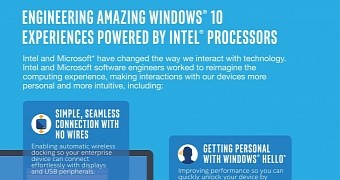Despite the fact that Windows 10 is an operating system which belongs to Microsoft, the Redmond-based software giant hasn't worked on this project all by itself and others deserve to be praised too for the way the new product performs right now.
And no, we're not talking about insiders, because they too have their own merit for Windows 10, but about Intel, Microsoft's partner which has helped build Cortana, Windows Hello, and Microsoft Edge, some of the key features of the new OS.
In a statement released today, which also includes an infographic, Intel explains how exactly it managed to improve Windows 10, explaining that some of the features in the OS were either developed using its know-how or tested and optimized for its new hardware, such as the Skylake line of processors.
Full support for Intel hardware
Cortana, for instance, which made its debut on the PC with Windows 10, is specifically optimized to run on Intel's 6th generation of processors.
“Intel and Microsoft are enabling the keyword spotter algorithm, which listens for phrases like 'Hey Cortana' to be offloaded to a dual-core digital signal processor within the processor SoC. This offloading functionality, when available on Windows 10, will allow Cortana to continue listening for commands with improved energy efficiency,” the company says.
But that's not all. Intel had a significant contribution to the development of Microsoft Edge too, which is the successor to Internet Explorer and the default browser in Windows 10.
Intel says its technologies, including the so-called Intel Speed Shift Technology, made it possible to improve responsiveness by dynamically managing power states. A number of other features, such as SIMD.js, have also been implemented by Intel.
Overall, it's good to see partners helping Microsoft build Windows, but it's pretty clear that having just one big name on your side is not enough. And the number of errors that users are getting these days because of hardware compatibility issues is living proof.
And by the way, time will tell if the good in “good operating system” needs any quotation marks or not.

 14 DAY TRIAL //
14 DAY TRIAL //